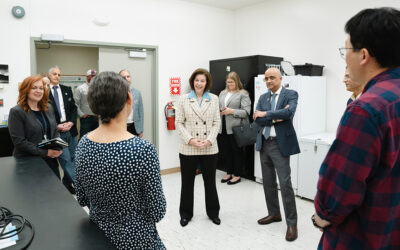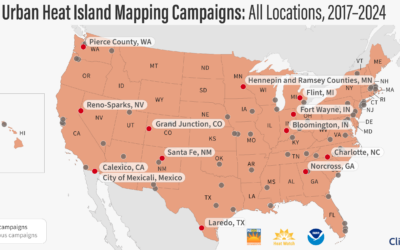National Science Foundation to establish a Regional Innovation Engine, a first-of-its-kind program to create focused research and technology transfer hubs.
LAS VEGAS – January 29, 2024 – The National Science Foundation (NSF) today announced a multi-institutional consortium – which includes UNLV and DRI – to confront the climate challenges facing the desert Southwest and spur economic development in the region.
The effects of climate change are acutely evident in the American West and Southwest, from the desertification of Utah’s Great Salt Lake to the record-breaking extreme heat in Arizona and the dwindling supply of the Colorado River reaching Nevada. NSF Engines: Southwest Sustainability Innovation Engine (SWSIE) will use these challenges to catalyze economic opportunity.
Led by Arizona State University and supported by core academic partners from throughout the region, SWSIE aims to establish the Southwest as a leader in carbon capture, water security and renewable energy and bring high-wage industries to the region. SWSIE unites academic, community, nonprofit and industry partners across Arizona, Nevada and Utah who are committed to this goal.
“The NSF Regional Innovation Engines award offers a new transformative avenue to apply our holistic sustainability innovation approach to the southwestern United States to keep this region on a pathway of economic growth,” said Peter Schlosser, vice president and vice provost of the Julie Ann Wrigley Global Futures Laboratory at ASU and principal investigator on this project. “The Southwest Sustainability Innovation Engine combines the extensive expertise of ASU and our partners to simultaneously ensure a sustainable future and prosperity for our region.”
SWSIE is among the first proposals selected by the NSF to establish a Regional Innovation Engine, a first-of-its-kind NSF program to create focused research and technology transfer hubs. The NSF will fund SWSIE’s initial development and growth with $15 million over the next two years. The engine can be renewed for up to 10 years with $160 million in funding available for each Regional Engine.
Strong partnerships for a shared future
Joining DRI, UNLV, and Arizona State University as core academic partners on the SWSIE team are the University of Utah, the Water Research Foundation, SciTech Institute and Maricopa Community Colleges.
“Big problems require bold solutions, and this consortium brings innovators from throughout the Southwest together to collaboratively and actively tackle the region’s most pressing water, energy, and related climate challenges,” said UNLV President Keith E. Whitfield. “The stakes are high, but this partnership allows the best and brightest academic minds to apply their collective skills and creatively find ways to secure a sustainable future.”
Both DRI and UNLV will serve as core academic partners on the project, leading and/or contributing to project management, innovation, workforce development, and community development teams.
“DRI looks forward to joining ASU, UNLV, and other partners to address the significant climate challenges impacting the Southwest while spurring innovation,” said DRI President Kumud Acharya. “DRI is honored to bring our experience in sustainable commercialization, workforce development, and community engagement practices to this transformative project.”
DRI’s long-term experience leading complex projects with academic, agency, and commercial partners will help drive solutions for water resources management and integrate with the expertise of other SWSIE partners. UNLV, through its Office of Economic Development, Research and Technology Park, and a host of academic units, will serve as a core site for technology transfer, commercialization, physical infrastructure (hi-tech labs, leasable space, co-working space), and workforce development.
In addition to the strengths of SWSIE’s core academic partners, the engine also combines expertise from more than 50 partners from industry, nonprofit organizations, and local governments.
Industry partners range from established companies with ambitious sustainability goals to businesses providing sustainability-based products and services, while municipal governments large and small, and nonprofit partners represent a variety of environmental interests across the Southwest. Nevada partners include Caesars Entertainment, Boyd Gaming, Southern Nevada Water Authority, Las Vegas Global Economic Alliance, Nevada Governor’s Office of Economic Development, StartupNV, Switch, NV5, Impact NV, and more. Learn more about just some of the many organizations contributing to SWSIE.
Fueling national leadership and regional growth
The Regional Innovation Engines program is overseen by the NSF Directorate for Technology, Innovation and Partnerships — the NSF’s first new directorate in more than 30 years — and is a new effort to establish regional economic, technological and societal leadership in areas highlighted in the “CHIPS and Science Act.”
NSF Engines are designed to assemble local and regional partners to rapidly develop and deploy solutions-inspired research and safeguard U.S. competitiveness in their respective focal areas. SWSIE is charged with pioneering advancements in water security, renewable energy and carbon neutrality — vital areas for sustainability in Utah, Nevada and Arizona.
“This partnership aligns leading research institutions and public/private partners around a shared vision to accelerate an already growing regional innovation ecosystem,” said Zachary Miles, UNLV senior associate vice president for economic development and the project’s workforce development lead. “Together with partners throughout Nevada and in Arizona and Utah, we’ll leverage our vast collective network of research, economic development and workforce partners to turn bright ideas into life-changing products and services.”
These co-developed solutions require new and revised skills to implement them. SWSIE will draw upon partners’ collective strengths to train that workforce. The engine will generate technical opportunities for the region, such as installing renewable energy systems, new water technologies and carbon capture infrastructure, as well as governmental and managerial positions focused on sustainability.
“DRI is eager to bring our recognized research expertise in sustainability issues related to water, energy, and carbon in Nevada and the Southwestern U.S. to the project,” said Sean McKenna, DRI executive director of hydrologic sciences and SWSIE co-innovation lead. “Our experience producing scientifically proven innovations to address real-world sustainability challenges through commercialization makes DRI well-poised to contribute solutions for the particular issues facing the region. The NSF’s new Regional Innovation Engine program is an exciting development for DRI scientists who excel at partnering with commercial, educational, and federal agencies to apply scientific expertise to support our communities.”
SWSIE’s work will involve not just transferring meaningful technology to market, but working with governments to ensure policy provides a fertile space for its use.
“We’re at a moment in the Southwest where the ongoing drought and unending heat we’re experiencing is focusing the minds of elected officials and stakeholders toward solutions,” said Scott Barclay, SWSIE chief operating officer and a professor with the School of Social and Behavioral Sciences in ASU’s New College. “And what SWSIE does is bring those actors directly into the conversation about what could work in their location, for their priorities, in a way that helps them transform the space.”
###
About DRI
The Desert Research Institute (DRI) is Nevada’s non-profit research institute, founded in 1959 to empower experts to focus on science that matters. We work with communities across the state –and the world– to address their most pressing scientific questions. We’re proud that our scientists continuously produce solutions that better human and environmental health. Scientists at DRI are encouraged to follow their research interests across the traditional boundaries of scientific fields, collaborating across DRI and with scientists worldwide. DRI brings nearly $5 in direct benefit to Nevada for every $1 in state investment, and our researchers actively explore commercialization opportunities for innovative inventions, including Climate Engine and Tu Biomics. DRI’s recognized STEM education programs work to increase inclusion in STEM engagement for youth of all ages while ensuring impactful and accessible education access to prepare students for the careers of tomorrow. At DRI, science isn’t merely academic – it’s the key to future-proofing our communities and building a better world. For more information, please visit www.dri.edu.
DRI will contribute to four key areas: Leading Co-Innovation, contributing to Water Co-Innovation, Workforce Development, and Community Development and Engagement. DRI’s long-term experience leading complex projects across academic, agency, and commercial partners to build science-focused solutions will guide Co-Innovation among partners to achieve the solutions needed within SWSIE. In particular, DRI’s expertise in building solutions for improved water resources management, in areas of basin-scale hydrology and water treatment, particularly in the southwestern U.S., will integrate with the expertise of other SWSIE partners. DRI is recognized as a leader in K-12 STEM education programs and will leverage that experience to contribute to SWSIE Workforce Development. DRI will also bring its community development and engagement experience to co-lead these efforts within SWSIE.
About UNLV
UNLV is an urban public university with rigorous educational programs that’s immersed in innovative research, scholarship, and creative activities. With nearly 31,000 students and 4,000 employees, UNLV holds the nation’s highest recognition for both research and community engagement – distinctions which underscore its vision to become a premier university in service of one of the nation’s fastest-growing and most enterprising regions.
Every day — in its labs and classrooms, in neighborhoods, and out in the field — UNLV is working to fuel Nevada’s economic engine. The university is proud of its home within the heart of a global destination, where UNLV’s students, employees, and alumni build community, create partnerships, advance healthcare, and spark innovation that move the region forward. Learn more at unlv.edu.
Accredited by the Northwest Commission on Colleges and Universities, UNLV is annually ranked as one of the nation’s most diverse universities for undergraduates and among the leaders advancing social mobility of its graduates. The university is committed to equity and inclusion throughout its operations and meets federal Minority Serving Institution requirements as an Asian American, Native American and Pacific Islander-Serving Institution, and as a Hispanic-Serving Institution.
Media Contacts:
DRI
Detra Page
Detra.Page@dri.edu
702.591.3786
UNLV
Keyonna Summers
Keyonna.Summers@unlv.edu
702.895.0898


